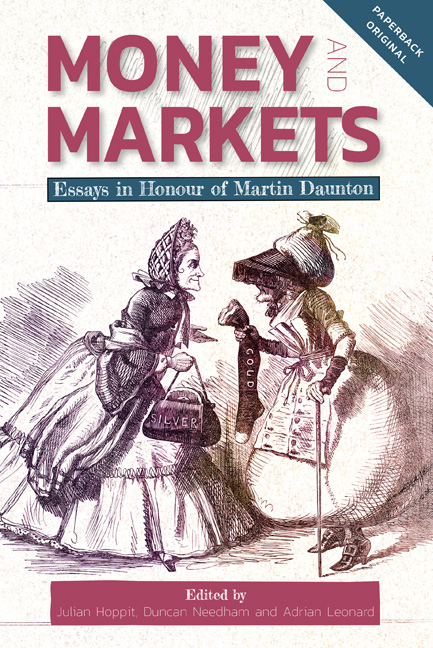Book contents
- Frontmatter
- Contents
- List of Figures
- List of Tables
- List of Contributors
- List of Abbreviations
- Introduction
- 1 Taxing London and the British Fiscal State, 1660–1815
- 2 Rents, Squalor, and the Land Question: Progress and Poverty
- 3 Marine Insurers, the City of London, and Financing the Napoleonic Wars
- 4 The Political Economy of Sir Robert Peel
- 5 Champagne Capitalism: France’s Adaptation to Britain’s Global Hegemony, 1830–80
- 6 The 1848 Revolution in Prussia: a Financial Interpretation
- 7 Imperial Germany, Great Britain and the Political Economy of the Gold Standard, 1867–1914
- 8 Knowledge, Contestation and Authority in the Eurodollar Market, 1959–64
- 9 Continuity and Change in British Conservative Taxation Policy, c. 1964–88
- 10 Britain Since the 1970s: a Transition to Neo-Liberalism?
- 11 Maplin: the Treasury and London’s Third Airport in the 1970s
- 12 Workfare and the Reinvention of the Social in America and Britain, c. 1965 to 1985
- 13 Charity and International Humanitarianism in Post-War Britain
- 14 Discounting Time
- 15 The Material Politics of Energy Disruption: Managing Shortages Amidst Rising Expectations, Britain 1930s–60s
- The Published Writings of Martin J. Daunton
- Index
- People, Markets, Goods: Economies and Societies in History ISSN: 2051-7467
8 - Knowledge, Contestation and Authority in the Eurodollar Market, 1959–64
Published online by Cambridge University Press: 13 April 2021
- Frontmatter
- Contents
- List of Figures
- List of Tables
- List of Contributors
- List of Abbreviations
- Introduction
- 1 Taxing London and the British Fiscal State, 1660–1815
- 2 Rents, Squalor, and the Land Question: Progress and Poverty
- 3 Marine Insurers, the City of London, and Financing the Napoleonic Wars
- 4 The Political Economy of Sir Robert Peel
- 5 Champagne Capitalism: France’s Adaptation to Britain’s Global Hegemony, 1830–80
- 6 The 1848 Revolution in Prussia: a Financial Interpretation
- 7 Imperial Germany, Great Britain and the Political Economy of the Gold Standard, 1867–1914
- 8 Knowledge, Contestation and Authority in the Eurodollar Market, 1959–64
- 9 Continuity and Change in British Conservative Taxation Policy, c. 1964–88
- 10 Britain Since the 1970s: a Transition to Neo-Liberalism?
- 11 Maplin: the Treasury and London’s Third Airport in the 1970s
- 12 Workfare and the Reinvention of the Social in America and Britain, c. 1965 to 1985
- 13 Charity and International Humanitarianism in Post-War Britain
- 14 Discounting Time
- 15 The Material Politics of Energy Disruption: Managing Shortages Amidst Rising Expectations, Britain 1930s–60s
- The Published Writings of Martin J. Daunton
- Index
- People, Markets, Goods: Economies and Societies in History ISSN: 2051-7467
Summary
In Worlds of political economy, Martin Daunton (with Frank Trentmann) proposes a new political economy to explore ‘the large and often neglected universe of economic knowledge and practices, and the way the two have shaped each other’. This approach ‘supports the political repositioning of economic subjects’ and moves beyond ‘the political and institutional settings of economic life’ to analyse the economic knowledge deeply embedded in milieus, its contested nature, form of authority, and transnational dynamics. In this way Daunton reappraises political economy ‘as a system of ideas, value, meanings’.
This chapter explores the Eurodollar market, an offshore market in US dollars, from the perspective of this new political economy. Historians and international political economists regard the nascent international money market as emblematic of the re-emergence of global finance that evaded controls on capital mobility after the return to convertibility of Western currencies in December 1958, the ‘real post-war turning point for the foreign exchange market’. Schenk highlights the role of innovative bankers in the City of London in the mid-1950s in inventing Eurodollars. These bankers offered higher interest rates on foreign dollars in London than American banks handicapped by the Federal Reserve's Regulation Q – the limit on the interest payable on domestic deposits. Others, notably Burn, stress ‘the historic specificity of the British state’ in which the Bank of England (‘the Bank’) and financial elites embraced the Eurodollar market to promote the interests of financial capital by promoting the City of London's standing as an international financial centre.
Beyond the institutional and political approach, this chapter examines the production of knowledge in and about the Eurodollar market in its formative years by concerned practitioners as well as various observers, monetary authorities, and international organisations. In the absence of a centralised institution for collecting information on Eurodollar business they proposed various explanations for its operations and prospects. Their opinions evolved into contestations over the present and future of the nascent market. Each discourse had its own unspoken practices, norms, and visions for the Eurodollar. Thus, the challenges not only highlight divergent understandings of the market, they were part of the market-making process itself.
- Type
- Chapter
- Information
- Money and MarketsEssays in Honour of Martin Daunton, pp. 145 - 160Publisher: Boydell & BrewerPrint publication year: 2019
- 1
- Cited by

